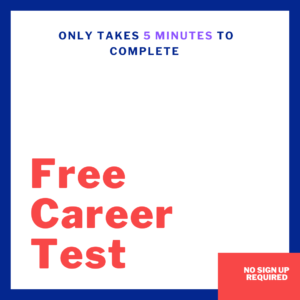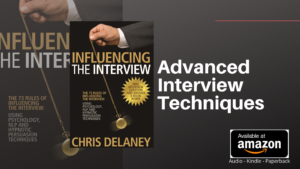What is the one thing all career professionals have in common?
Each must attend a job interview to advance their career.
Understanding the recruitment process, therefore, is key to a successful career, gaining promotions, and increasing a salary.
On average, career professionals will change jobs at least once every three to five years. The days of working in one organisation for life have long gone.
Are you interview-ready?
Even with regular job interviews, the number of job hunters who prepare in advance for a job interview is extremely low.
Being ‘interview ready’ means an increase in confidence. Confidence increase self-promotion and self-promotion increases job offers.
More importantly, understanding the secrets of a job interview can lead to consistent high-scoring interview answers.
What makes a successful job interview?
Research has shown that an applicant’s ability to predict the job criteria, due to possessing a high level of sector knowledge/experience, results in the interviewer being able to accurately predict the job performance (the objective of the interview process) of each candidate.
This means, the more an interviewee reference industry jargon, sector models, and relevant working examples, especially when communicated confidently, the more an employer will presume or predict that the applicant is well suited for the advertised role: the applicant’s interview identity.
Each interview answer is referenced against the job criteria on the interview scorecard as part of a structured job interview – the most commonly used recruitment process. Answers that don’t highlight the candidate’s high level of expertise are likely to score low.
The interview is a two-horse race.
On average, applicants are asked 8 job interview questions, with each question scored on a scale of 1-4, with 4 being the best scoring answer.
The total number of points available is 32.
Because weaker applicants are shifted out during the application process stage, the candidates being interviewed will all score, in the main, 3’s or 4’s for each interview question.
This creates a close race, where every point counts.
Employers have told us how the winning interviewee will only have one or two additional points above the next most suitable applicant.
Unforeseen forces affect the interviewer’s allocated scores, such as job interview unconscious bias. But in the main, the candidate’s ability to communicate competencies creates high or low scoring answers.
How to ace the job interview.
The three rules for a successful job interview outcome are:
- Identify the job criteria
- Be a self-promoter
- Communicate with confidence
In addition, there are psychological interview tactics that can be embedded into the recruitment process including the process of creating likeability.
The common mistakes applicants make in job interviews are:
Using the same job examples in all job interviews
Having pre-prepared interview answers is a must in a job interview, as the rehearsal of the perfect answer ensures that the answer is delivered with confidence – rules 3.
The barrier though is ‘laziness’. Many career professionals will re-use the same interview stories time and time again.
Yes, their answer is perfectly delivered, as practice creates perfection. But, the original answer was designed for a previous role.
Rule 1, is to identify the job criteria. Creating interview answers based only on the job criteria for each position ensures that each answer will score high as the examples used will reference the required skills, knowledge, and experience for that role.
The same example or situation can be used for multiple recruitment processes, but the frame of the answer – what the example is highlighting has to be specific to the advertised position and the culture of the organisation.
Reserved or forthcoming?
In the UK, especially, job applicants like to be reserved. They will answer interview questions, but the answers lack the benefits, fail to self-promote and in general the interviewee is unforthcoming.
The job interview is the one place where you must be a self-promoter – the 2nd rule of a successful job interview.
To self-promote candidates can ustilse verbal and non-verbal communciation:
Non-verbal communication
- Smiling is associated with confidence and competence
- Nodding in agreement as the employers speaks and this helps to build rapport
- Open body language, gestures and a relaxed postures is linked self-esteem
- Strong eye-contact while speaking creates authority
- What you wear can influence how the candidate is seen – desirable or unsuitable

Verbal communication
- Long descriptive paragraphs help to paint the scene allowing an employer to understand the relevance of the job interview answer
- Positive language is associated with a good worker
- Mentioning the job criteria (rule 1) shows suitability
- Giving examples highlights experiences
- Explaining models and theories shows expertise
- Changing pitch, tonality, and volume help to maintain employer interest
Is confidence charismatic?
Certain people stand out in the crowd.
We don’t know why our eyes are drawn to them, but something about them; how they dress, their posture, the way th move, or maybe a communication of facts make them a focus point.
It is the same in a job interview. A team of interviewers speak to numerous applicants throughout the recruitment period, with most candidates having a similar level of skills and experiences, but one or maybe two applicant stand out – why?
It is often the self-assurance of an applicant that increases their internal level of confidence. An increase in confidence, increases charisma.
Imposture syndrome, not believing you are at the right level for the job in question (even though you meet the criteria for the advertised role), is the biggest barrier to interview confidence.

Are you an anxious interviewee?
Anxious interviewees will:
- Fidgeting, which distracts the employer’s attention
- Mumble and use excessive filler words
- Give short snappy answers to technical interview questions
- Often look down, killing any previously built up rapport including that from the halo effect
- Self-disclose weaknesses and past errors which results in low scoring interview answers
Charismatic and highly confident applicants will:
- Frame interview questions so all answers sound positive
- Focus on solutions, not problems
- Create a conversation by asking questions throughout the job interview
- Have a relaxed manner; sitting back in the chair, taking their time to reply, and using anecdotes and stories
- Eye contact is strong, and they speak using natural gestures
- Interview answers are detailed and well structured
- Answers naturally reference several key job criteria
- Give their full attention to the interviewer

















